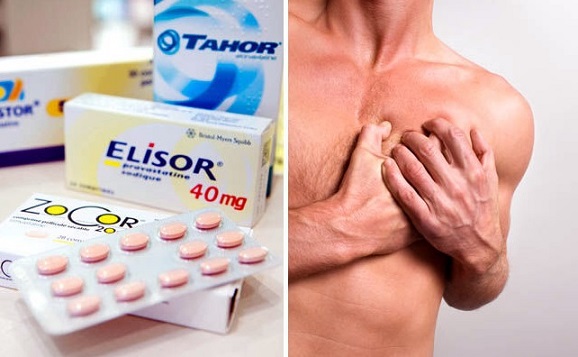Nikhil Prasad Fact checked by:Thailand Medical News Team Jan 07, 2025 3 months, 6 days, 15 minutes ago
Medical News: Myocardial infarction, commonly referred to as a heart attack, is one of the most significant cardiovascular emergencies. While traditionally linked to factors like age, lifestyle, and genetics, researchers have brought to light a concerning contributor: the use of specific drugs. Drug-induced myocardial infarction (MI) is a phenomenon that has become increasingly recognized, highlighting the critical need for awareness about its causes, mechanisms, and prevention.
 Exploring Drug Induced Myocardial Infarction
Exploring Drug Induced Myocardial Infarction
A recent comprehensive review conducted by Ioana Boarescu and Paul-Mihai Boarescu sheds light on this issue. Both researchers are affiliated with the Neurology and Cardiology Departments of Clinical Emergency County Hospital Saint John the New and the “Stefan cel Mare” University of Suceava, Romania.
Their work which is covered in this
Medical News report, aims to educate healthcare professionals and the general public about the risks of drug-induced MI, offering insights into prevention and management.
What Is Drug-Induced Myocardial Infarction?
Drug-induced myocardial infarction refers to heart damage caused by the use of certain substances. These substances range from prescription medications to recreational drugs and can trigger MI through mechanisms like coronary vasospasm, increased myocardial oxygen demand, endothelial dysfunction, accelerated atherosclerosis, thrombosis, or direct myocardial toxicity. The condition’s occurrence underscores the complex interplay between pharmacological agents and cardiovascular health.
Key Culprits Identified
The study identifies several categories of drugs implicated in increasing the risk of myocardial infarction. Each class of drugs poses risks through distinct mechanisms, making it vital to understand their impact in greater detail.
-Nonsteroidal Anti-Inflammatory Drugs (NSAIDs): NSAIDs are widely used for pain relief and inflammation control, often taken without prescription. Despite their benefits, NSAIDs can impair vascular endothelial function, raise blood pressure, and disturb platelet aggregation. These effects heighten the risk of thrombotic events. COX-2 inhibitors, a subset of NSAIDs, reduce the synthesis of protective prostaglandins while leaving pro-thrombotic pathways unchecked. Naproxen, while considered relatively safer, still carries risks that should not be overlooked.
-Hormonal Therapies: Hormones like estrogen and testosterone are critical to physiological balance but can pose cardiovascular risks when used inappropriately. Estrogen-containing oral contraceptives are known to increase thrombotic risks, particularly in smokers or older women. Testosterone replacement therapy, often used to address age-related decline, has been associated with cardiovascular events when not carefully monitored.
-Catecholamines: Drugs like adrenaline and noradrenaline are lifesaving in emergencies but can also induce coronary vaso
spasm and increase myocardial oxygen demand. High doses may cause myocardial damage even in the absence of coronary artery blockages, especially in vulnerable individuals.
-Glucocorticoids: These anti-inflammatory drugs are commonly used to treat autoimmune and inflammatory conditions. However, they are associated with hypertension, dyslipidemia, and endothelial dysfunction. These side effects can accelerate atherosclerosis and increase the likelihood of myocardial infarction.
-Anticoagulants: Although designed to prevent blood clots, anticoagulants can sometimes cause bleeding within arterial plaques, destabilizing them and leading to clot formation. This paradoxical effect underscores the complexity of managing cardiovascular risks.
-Recreational Drugs: Substances like cocaine, amphetamines, and cannabis are potent triggers for myocardial infarction. Cocaine, in particular, causes intense coronary vasospasm, severely limiting blood flow. Chronic use of stimulants like amphetamines can lead to long-term cardiovascular damage.
Mechanisms Behind the Damage
The study provides a detailed breakdown of how these substances impact the heart:
-Coronary Vasospasm: This mechanism involves the constriction of coronary arteries, reducing blood flow to the heart. Cocaine, amphetamines, and triptans (used for migraines) are among the drugs that trigger vasospasm.
-Endothelial Dysfunction: Drugs like glucocorticoids and NSAIDs impair the function of the endothelium, the inner lining of blood vessels. This dysfunction reduces the production of nitric oxide, a critical vasodilator, leading to vascular rigidity and increased thrombotic risks.
-Accelerated Atherosclerosis: Chronic use of certain drugs can worsen lipid profiles, increase inflammation, and accelerate the formation of arterial plaques. Antipsychotics and glucocorticoids are notable contributors.
-Thrombosis: Some drugs disturb the balance between pro-thrombotic and anti-thrombotic factors, leading to the formation of blood clots. Catecholamines, for example, promote platelet activation and enhance clot formation.
-Direct Myocardial Toxicity: High levels of catecholamines or chemotherapy agents can directly damage heart cells. This damage often manifests as necrosis or apoptosis, even without significant arterial obstruction.
Clinical Implications and Symptoms
The symptoms of drug-induced myocardial infarction often overlap with traditional MI, including chest pain, fatigue, and shortness of breath. However, the presentation can vary widely depending on the causative drug and the patient’s health. Silent or atypical symptoms are common in high-risk populations, such as older adults and individuals with diabetes.
Managing and Preventing Drug-Induced Myocardial Infarction
Management strategies for drug-induced MI prioritize identifying and discontinuing the causative agent. Once the drug is stopped, standard acute MI treatments - including oxygen therapy, antiplatelet agents, and statins - are initiated. Severe cases may require advanced interventions such as percutaneous coronary intervention (PCI) or coronary artery bypass grafting (CABG).
Preventative measures include:
-Screening for cardiovascular risk factors in patients prescribed high-risk medications.
-Providing alternative treatments where possible.
-Educating patients on the risks associated with recreational drug use.
Conclusions
Drug-induced myocardial infarction is a growing concern in cardiovascular medicine. As the use of complex pharmacological agents increases, so does the risk of adverse cardiac events. This condition underscores the importance of vigilance in prescribing and monitoring medications.
Physicians should take a proactive role in identifying at-risk patients, minimizing exposure to cardiotoxic drugs, and educating patients about potential risks. Additionally, addressing the misuse of recreational drugs is paramount to reducing the burden of drug-induced MI. Future research should continue exploring innovative strategies to counteract drug-related cardiac effects and improve outcomes for affected individuals.
The study findings were published in the peer-reviewed journal: Journal of Cardiovascular Development and Disease.
https://www.mdpi.com/2308-3425/11/12/406
For the latest on Heart Health, keep on logging to Thailand
Medical News.
Read Also:
https://www.thailandmedical.news/news/breaking-japanese-study-finds-u-s-fda-approved-and-promoted-covid-19-drug-remdesivir-induces-cardiomyocyte-dysfunction-and-is-cardiotoxic
https://www.thailandmedical.news/news/favipiravir-that-was-used-to-treat-covid-19-actually-causes-lung-inflammation-lung-damage-and-lung-fibrosis
https://www.thailandmedical.news/news/breaking-a-must-for-all-doctors-to-read-scientists-warn-that-covid-19-affects-cytochrome-p450-3a4-mediated-drug-metabolism-and-drug-interactions
https://www.thailandmedical.news/news/brigham-study-finds-that-more-than-50-percent-of-cancer-drugs-granted-accelerated-approval-by-u-s--fda-do-not-work-and-sometime-kills
https://www.thailandmedical.news/news/pharma-news-swedish-researchers-warn-that-many-cancer-drugs-are-being-approved-despite-lack-of-proper-efficacy
